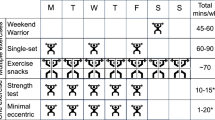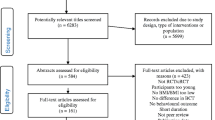Abstract
Purpose
The aim of the present study was to investigate the effect of exercise intensity on energy intake post-exercise and its relationship with enjoyment and rating of perceived exertion (RPE) generated by exercise.
Methods
For this, nine sedentary overweight men performed high-intensity intermittent exercise and steady-state exercise, totaling 30 min for both exercise sessions, and energy intake post-exercise was evaluated. Rating of perceived exertion and enjoyment scores were also measured immediately post-exercise.
Results
There was no difference in the amount of calories ingested post-exercise between conditions, enjoyment scores and RPE. There was a negative correlation between enjoyment and energy intake (r = − 0.552 [strong]; p = 0.018).
Conclusions
These data demonstrated that independent of exercise intensity, enjoyment scores were related to post-exercise energy intake.

Similar content being viewed by others
Abbreviations
- RPE:
-
Rating of perceived exertion
- MAP:
-
Maximal aerobic power
- HIIE:
-
High-intensity intermittent exercise
- SSE:
-
Steady-state exercise
- \( \dot{V}{\rm O}_2 {\rm peak} \) :
-
Peak oxygen uptake
References
Guh DP, Zhang W, Bansback N, Amarsi Z, Birmingham CL, Anis AH (2009) The incidence of co-morbidities related to obesity and overweight: a systematic review and meta-analysis. BMC Public Health 9(1):88. https://doi.org/10.1186/1471-2458-9-88
Thorogood A, Mottillo S, Shimony A, Filion KB, Joseph L, Genest J et al (2011) Isolated aerobic exercise and weight loss: a systematic review and meta-analysis of randomized controlled trials. Am J Med 124(8):747–755. https://doi.org/10.1016/j.amjmed.2011.02.037
Melanson EL, Keadle SK, Donnely JE, Braun B, King NA (2013) Resistance to exercise-induced weight loss: compensatory behavioral adaptations. Med Sci Sports Exerc 45(8):1600–1609. https://doi.org/10.1249/MSS.0b013e31828ba942
Buscemi S, Castellini G, Batsis JA, Ricca V, Sprin D, Galvano F et al (2013) Psychological and behavioural factors associated with long-term weight maintenance after a multidisciplinary treatment of uncomplicated obesity. Eat Weight Disord 18(4):351–358. https://doi.org/10.1007/s40519-013-0059-2
Holliday A, Blannin A (2017) Appetite, food intake and gut hormone responses to intense aerobic exercise of different duration. J Endrocrinol 235(3):193–205. https://doi.org/10.1530/JOE-16-0570
Kawano H, Mineta M, Asaka M, Miyashita M, Numao S, Gando Y et al (2013) Effects of different modes of exercise on appetite and appetite-regulating hormones. Appetite 66:26–33. https://doi.org/10.1016/j.appet.2013.01.017
Crabtree DR, Blannin AK (2015) Effects of exercise in the cold on Ghrelin, PYY, and food intake in overweight adults. Med Sci Sports Exerc 47(1):49–57. https://doi.org/10.1249/MSS.0000000000000391
Bailey DP, Smith LR, Christmas BC, Taylor L, Stensel DJ, Deighton K et al (2015) Appetite and gut hormone responses to moderate-intensity continuous exercise versus high-intensity interval exercise, in normoxic and hypoxic conditions. Appetite 89:237–245. https://doi.org/10.1016/j.appet.2015.02.019
Rumbold P, Shaw E, James L, Stevenson E (2015) Milk consumption following exercise reduces subsequent energy intake in female recreational exercisers. Nutrients 7(1):293–305. https://doi.org/10.3390/nu7010293
Clayton DJ, Stensel DJ, Watson P, James LJ (2014) The effect of post-exercise drink macronutrient content on appetite and energy intake. Appetite 82:173–179. https://doi.org/10.1016/j.appet.2014.07.013
Schubert MM, Hall S, Leveritt M, Grant G, Sabapath S, Desbrow B (2014) Caffeine consumption around an exercise bout: effects on energy expenditure, energy intake, and exercise enjoyment. J Appl Physiol 117(7):745–754. https://doi.org/10.1152/japplphysiol.00570.2014
Panissa VLG, Julio UF, Hardt F, Kurashima C, Lira FS, Takito MY, Franchini E (2016) Effect of exercise intensity and mode on acute appetite control in men and women. Appl Physiol Nutr Metab 41(10):1083–1091. https://doi.org/10.1139/apnm-2016-0172
Shamlan G, Bech P, Robertson MD, Collins AL (2017) Acute effects of exercise intensity on subsequent substrate utilisation, appetite, and energy balance in men and women. Appl Physiol Nutr Metab 42(12):1247–1253. https://doi.org/10.1139/apnm-2017-0280
Deighton K, Karra E, Batterham RL, Stensel DJ (2013) Appetite, energy intake, and PYY3–36 responses to energy-matched continuous exercise and submaximal high-intensity exercise. Appl Physiol Nutr Metab 38(9):947–952. https://doi.org/10.1139/apnm-2012-0484
Howe SM, Hand TM, Larson-Meyer DE, Austin KJ, Alexander BM, Manore MM (2016) No effect of exercise intensity on appetite in highly-trained endurance women. Nutrients 8(4):223, 1–13. https://doi.org/10.3390/nu8040223
Martins C, Stensvold D, Finlayson G, Holst J, Wisloff U, Kulseng B et al (2015) Effect of moderate-and high-intensity acute exercise on appetite in obese individuals. Med Sci Sports Exerc 47(1):40–48. https://doi.org/10.1249/MSS.0000000000000372
Keating SE, Johnson NA, Mielke GI, Coombes JS (2017) A systematic review and meta-analysis of interval training versus moderate-intensity continuous training on body adiposity. Obes Rev 18(8):943–964. https://doi.org/10.1111/obr.12536
Bartlett JD, Close GL, MacLaren DP, Gregson W, Drust B, Morton JP (2011) High-intensity interval running is perceived to be more enjoyable than moderate-intensity continuous exercise: implications for exercise adherence. J Sports Sci 29(6):547–553. https://doi.org/10.1080/02640414.2010.545427
Jung ME, Bourne JE, Little JP (2014) Where does HIT fit? An examination of the affective response to high-intensity intervals in comparison to continuous moderate-and continuous vigorous-intensity exercise in the exercise intensity-affect continuum. PLoS ONE 9(12):e114541. https://doi.org/10.1371/journal.pone.0114541
Unick JL, Michael JC, Jakicic JM (2012) Affective responses to exercise in overweight women: initial insight and possible influence on energy intake. Psychol Sport Exerc 13(5):528–532. https://doi.org/10.1016/j.psychsport.2012.02.012
Schneider KL, Spring B, Pagoto SL (2009) Exercise and energy intake in overweight, sedentary individuals. Eat Behav 10(1):29–35. https://doi.org/10.1016/j.eatbeh.2008.10.009
Fearnbach SN, Masterson TD, Schlechter HA, Loken E, Downs DS, Thivel D, Keller KL (2017) Perceived exertion during exercise is associated with children’s energy intake. Med Sci Sports Exerc 49(4):785–792. https://doi.org/10.1249/MSS.0000000000001165
Di Corrado D (2017) Biological underpinnings of mood and the role of physical exercise. Sport Sci Health 13(3):461–468. https://doi.org/10.1007/s11332-017-0374-5
Mifflin MD, St Jeor ST, Hill LA, Scott BJ, Daugherty SA, Koh YO (1990) A new predictive equation for resting energy expenditure in healthy individuals. Am J Clin Nutr 51(2):241–247
Universidade Estadual de Campinas - UNICAMP. Tabela brasileira de composição de alimentos - TACO. 4. ed. rev. e ampl. Campinas: UNICAMP/NEPA, 2011. http://www.nepa.unicamp.br/taco/tabela.php?ativo=tabela. Accessed 18 Jun 2017
Borg GA (1982) Psychophysical bases of perceived exertion. Med Sci Sports Exerc 14(5):377–381
Kendzierski D, DeCarlo KJ (1991) Physical activity enjoyment scale: two validation studies. J Sport Exerc Psychol 13(1):50–64. https://doi.org/10.1123/jsep.13.1.50
Hopkins WG (2010) A scale of magnitudes for effect statistics. A new view of statistics. http://sportsci.org/resource/stats/effectmag.Html. Accessed 8 Dec 2017
Cohen J (1977) Statistical power analysis for the behavioral sciences (revised ed)
Sim AY, Wallman KE, Fairchild TJ, Guelfi KJ (2014) High-intensity intermittent exercise attenuates ad libitum energy intake. Int J Obes 38(3):417–422. https://doi.org/10.1038/ijo.2013.102
Craig AD (2010) The sentient self. Brain Struct Funct 214:563–577. https://doi.org/10.1007/s00429-010-0248-y
Zénon A, Sidibé M, Olivier E (2015) Disrupting the supplementary motor area makes physical effort appear less effortful. J Neurosci 35(23):8737–8744. https://doi.org/10.1523/JNEUROSCI.3789-14.2015
Begg DP, Woods SC (2013) The endocrinology of food intake. Nat Rev Endocrinol 9(10):584–597. https://doi.org/10.1038/nrendo.2013.136
Thum JS, Parsons G, Whittle T, Astorino TA (2017) High-intensity interval training elicits higher enjoyment than moderate intensity continuous exercise. PLoS ONE 12(1):e0166299. https://doi.org/10.1371/journal.pone.0166299
Decker ES, Ekkekakis P (2017) More efficient, perhaps, but at what price? Pleasure and enjoyment responses to high-intensity interval exercise in low-active women with obesity. Psychol Sport Exerc 28:1–10. https://doi.org/10.1016/j.psychsport.2016.09.005
Frazão DT, de Farias Junior LF, Dantas TCB, Krinski K, Elsangedy HM, Prestes J et al (2016) Feeling of pleasure to high-intensity interval exercise is dependent of the number of work bouts and physical activity status. PLoS ONE 11(3):e0152752. https://doi.org/10.1371/journal.pone.0152752
Martinez N, Kilpatrick MW, Salomon K, Jung ME, Little JP (2015) Affective and enjoyment responses to high-intensity interval training in overweight-to-obese and insufficiently active adults. J Sport Exerc Psychol 37(2):138–149. https://doi.org/10.1123/jsep.2014-0212
Bauman AE, Reis RS, Sallis JF, Wells JC, Loos RJ, Martin BW (2012) Correlates of physical activity: why are some people physically active and others not? Lancet 380(9838):258–271. https://doi.org/10.1016/S0140-6736(12)60735-1
Rhodes RE, Fiala B, Conner M (2009) A review and meta-analysis of affective judgments and physical activity in adult populations. Ann Behav Med 38(3):180–204. https://doi.org/10.1007/s12160-009-9147-y
Brock DW, Chandler-Laney PC, Alvarez JA, Gower BA, Gaesser GA, Hunter GR (2010) Perception of exercise difficulty predicts weight regain in formerly overweight women. Obesity 18(5):982–986. https://doi.org/10.1038/oby.2009.318
Islam H, Townsend LK, Hazell TJ (2016) Modified sprint interval training protocols. Part I. Physiological responses. Appl Physiol Nutr Metab 42(4):339–346. https://doi.org/10.1139/apnm-2016-0478
Kilpatrick MW, Martinez N, Little JP, Jung ME, Jones AM, Price NW, Lende D (2015) Impact of high-intensity interval duration on perceived exertion. Med Sci Sports Exerc 47(5):1038–1045. https://doi.org/10.1249/MSS.0000000000000495
Zenko Z, Ekkekakis P, Ariely D (2016) Can you have your vigorous exercise and enjoy it too? Ramping intensity down increases postexercise, remembered, and forecasted pleasure. J Sport Exerc Psychol 38(2):149–159. https://doi.org/10.1123/jsep.2015-0286
Ariely D, Carmon Z (2000). Gestalt characteristics of experiences: the defining features of summarized events. J Behav Decis Making 13(2):191–201. https://doi.org/10.1002/(sici)1099-0771(200004/06)13:2<191::aid-bdm330>3.0.co;2-a
Ariely D, Zauberman G (2003) Differential partitioning of extended experiences. Organ Behav Hum Decis Process 91(2):128–139. https://doi.org/10.1016/S0749-5978(03)00061-X
Douglas JA, King JA, Clayton DJ, Jackson AP, Sargeant JA, Thackray A, Davies MJ, Stensel DJ (2017) Acute effects of exercise on appetite, ad libitum energy intake and appetite-regulatory hormones in lean and overweight/obese men and women. Int J Obes 41(12):1737–1744
Acknowledgements
This study was supported by CNPQ (402629/2016-7). Alícia Tavares da Silva Gomes was supported by CNPQ (800585/2016-0). Ursula Ferreira Julio was supported by CNPQ (150549/2016-4). Emerson Franchini was supported by FAPESP (2017/08167-2). Valéria Leme Gonçalves Panissa was supported by FAPESP (2015/11302-3 and 2017/07304-6). Monica Yuri Takito was supported by FAPESP (2017/19280-4). Elaine Domingues Alves was supported by CNPq (133949/2017-6).
Author information
Authors and Affiliations
Corresponding author
Ethics declarations
Conflict of interest
The authors declare that they have no conflict of interest relating to the publication of this manuscript.
Ethical approval
All procedures were approved by institutional ethic review of the School of Physical Education and Sport, University of São Paulo, Brazil.
Informed consent
All subjects provided written informed consent.
Rights and permissions
About this article
Cite this article
Gomes, A.T.S., Julio, U.F., Takito, M.Y. et al. Energy intake post-exercise is associated with enjoyment independently of exercise intensity. Sport Sci Health 14, 511–516 (2018). https://doi.org/10.1007/s11332-018-0449-y
Received:
Accepted:
Published:
Issue Date:
DOI: https://doi.org/10.1007/s11332-018-0449-y




